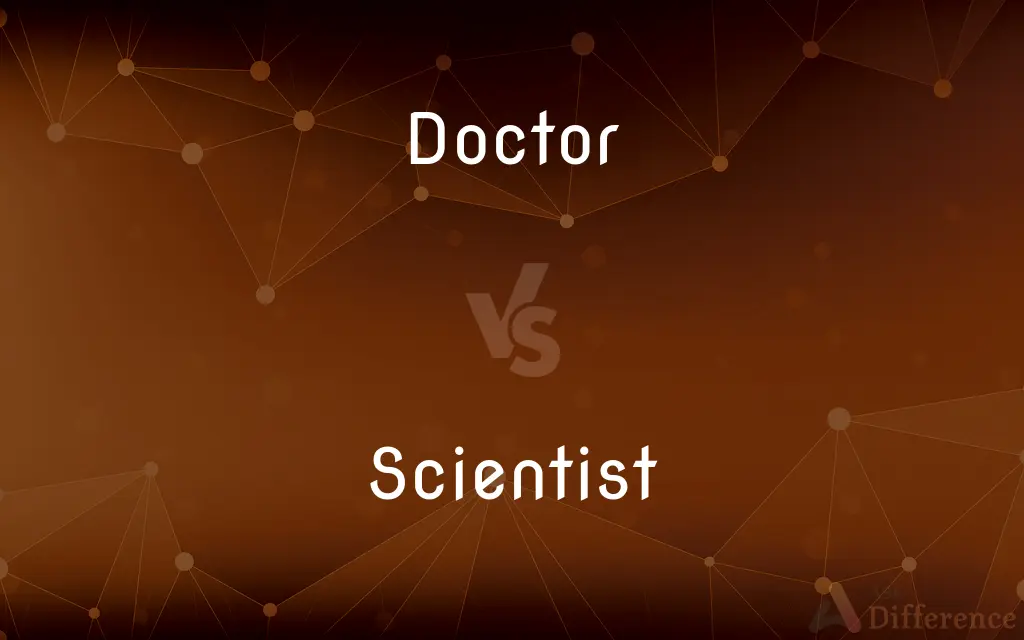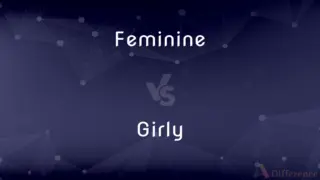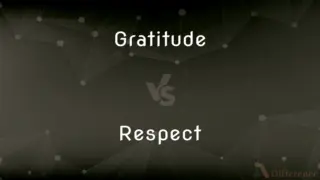Doctor vs. Scientist — What's the Difference?
By Tayyaba Rehman — Updated on October 27, 2023
Doctor is a professional trained to treat illnesses. Scientist is a person conducting systematic studies in a field of knowledge.

Difference Between Doctor and Scientist
Table of Contents
ADVERTISEMENT
Key Differences
Doctor focuses on diagnosing and treating patients. Scientist investigates natural phenomena through research.
Doctors are involved in practical healthcare applications. Scientists often work in laboratories or in the field.
The goal of a doctor is to heal and prevent diseases. The aim of a scientist is to expand knowledge and understanding.
Comparison Chart
Primary Function
Treat and prevent illness
Conduct research and experiments
Work Environment
Hospitals, clinics
Laboratories, field sites
ADVERTISEMENT
Goal
Patient care and health
Discovery and knowledge expansion
Education
Medical degree
Various degrees depending on field
Interaction
Direct with patients
Often indirect with the public
Compare with Definitions
Doctor
A medical professional treating illnesses.
The doctor prescribed medication for the cold.
Scientist
A researcher conducting scientific studies.
The scientist published her findings in a journal.
Doctor
A physician practicing medicine.
She visited the doctor for a check-up.
Scientist
An expert in a scientific field.
The scientist gave a lecture on climate change.
Doctor
A specialist in healthcare.
The doctor performed a successful surgery.
Scientist
A professional in scientific exploration.
The scientist discovered a new species.
Doctor
A person who is licensed to practice medicine and has trained at a school of medicine or a school of osteopathic medicine; a physician.
Scientist
Someone dedicated to scientific inquiry.
As a scientist, he spent hours in the lab.
Doctor
Any of certain other healthcare professionals, such as a dentist, optometrist, chiropractor, podiatrist, or veterinarian.
Scientist
A scientist is a person who conducts scientific research to advance knowledge in an area of interest.In classical antiquity, there was no real ancient analog of a modern scientist. Instead, philosophers engaged in the philosophical study of nature called natural philosophy, a precursor of natural science.
Doctor
A practitioner of alternative medicine or folk medicine who does not have traditional medical credentials.
Scientist
A person who is engaged in and has expert knowledge of a science, especially a biological or physical science.
Doctor
A person who has earned the highest academic degree, usually a PhD, awarded by a college or university in a specified discipline.
Scientist
One whose activities make use of the scientific method to answer questions regarding the measurable universe. A scientist may be involved in original research, or make use of the results of the research of others.
Doctor
A person awarded an honorary degree by a college or university.
Scientist
One learned in science; a scientific investigator; one devoted to scientific study; a savant.
Doctor
Abbr. Dr. Used as a title and form of address for a person holding the degree of doctor.
Scientist
A person with advanced knowledge of one of more sciences
Doctor
Roman Catholic Church An eminent theologian.
Scientist
A person contributing to scientific knowledge.
The scientist won an award for her research.
Doctor
A rig or device contrived for remedying an emergency situation or for doing a special task.
Doctor
(Informal) To give medical treatment to
"[He] does more than practice medicine. He doctors people. There's a difference" (Charles Kuralt).
Doctor
To repair, especially in a makeshift manner; rig.
Doctor
To falsify or change in such a way as to make favorable to oneself
Doctored the evidence.
Doctor
To add ingredients so as to improve or conceal the taste, appearance, or quality of
Doctor the soup with a dash of sherry.
Doctor
To alter or modify for a specific end
Doctored my standard speech for the small-town audience.
Doctor
(Baseball) To deface or apply a substance to (the ball) in violation of the rules in order to throw a pitch with extraordinary movement
Was ejected because he doctored the ball with a piece of sandpaper.
Doctor
To practice medicine.
Doctor
A physician; a member of the medical profession; one who is trained and licensed to heal the sick or injured. The final examination and qualification may award a doctor degree in which case the post-nominal letters are D.O., DPM, M.D., DMD, DDS, in the US or MBBS in the UK.
If you still feel unwell tomorrow, see your doctor.
Doctor
A person who has attained a doctorate, such as a Ph.D. or Th.D. or one of many other terminal degrees conferred by a college or university.
Doctor
A veterinarian; a medical practitioner who treats non-human animals.
Doctor
A nickname for a person who has special knowledge or talents to manipulate or arrange transactions.
Doctor
(obsolete) A teacher; one skilled in a profession or a branch of knowledge; a learned man.
Doctor
(dated) Any mechanical contrivance intended to remedy a difficulty or serve some purpose in an exigency.
The doctor of a calico-printing machine, which is a knife to remove superfluous colouring matter
The doctor, or auxiliary engine, also called "donkey engine"
Doctor
A fish, the friar skate.
Doctor
A ship's cook.
Doctor
(transitive) To act as a medical doctor to.
Her children doctored her back to health.
Doctor
To act as a medical doctor.
Doctor
(transitive) To make (someone) into an (academic) doctor; to confer a doctorate upon.
Doctor
(transitive) To physically alter (medically or surgically) a living being in order to change growth or behavior.
They doctored their apple trees by vigorous pruning, and now the dwarfed trees are easier to pick.
We may legally doctor a pet to reduce its libido.
Doctor
(transitive) To genetically alter an extant species.
Mendel's discoveries showed how the evolution of a species may be doctored.
Doctor
(transitive) To alter or make obscure, as with the intention to deceive, especially a document.
To doctor the signature of an instrument with intent to defraud is an example of forgery.
Doctor
(transitive) To adulterate, drug, or poison (drink).
Doctor
To take medicine.
Doctor
A teacher; one skilled in a profession, or branch of knowledge; a learned man.
One of the doctors of Italy, Nicholas Macciavel.
Doctor
An academical title, originally meaning a man so well versed in his department as to be qualified to teach it. Hence: One who has taken the highest degree conferred by a university or college, or has received a diploma of the highest degree; as, a doctor of divinity, of law, of medicine, of music, or of philosophy. Such diplomas may confer an honorary title only.
Doctor
One duly licensed to practice medicine; a member of the medical profession; a physician.
By medicine life may be prolonged, yet deathWill seize the doctor too.
Doctor
Any mechanical contrivance intended to remedy a difficulty or serve some purpose in an exigency; as, the doctor of a calico-printing machine, which is a knife to remove superfluous coloring matter; the doctor, or auxiliary engine, called also donkey engine.
Doctor
The friar skate.
Doctor
To treat as a physician does; to apply remedies to; to repair; as, to doctor a sick man or a broken cart.
Doctor
To confer a doctorate upon; to make a doctor.
Doctor
To tamper with and arrange for one's own purposes; to falsify; to adulterate; as, to doctor election returns; to doctor whisky.
Doctor
To practice physic.
Doctor
A licensed medical practitioner;
I felt so bad I went to see my doctor
Doctor
(Roman Catholic Church) a title conferred on 33 saints who distinguished themselves through the othodoxy of their theological teaching;
The Doctors of the Church greatly influenced Christian thought down to the late Middle Ages
Doctor
Children take the roles of doctor or patient or nurse and pretend they are at the doctor's office;
The children explored each other's bodies by playing the game of doctor
Doctor
A person who holds Ph.D. degree from an academic institution;
She is a doctor of philosophy in physics
Doctor
Alter and make impure, as with the intention to deceive;
Sophisticate rose water with geraniol
Doctor
Give medical treatment to
Doctor
Restore by replacing a part or putting together what is torn or broken;
She repaired her TV set
Repair my shoes please
Doctor
Holder of a medical degree.
After years of study, he became a doctor.
Doctor
A clinician working with patients.
The family doctor knows our medical history.
Common Curiosities
Do scientists treat patients?
Generally no, unless they're also trained as doctors.
Are all doctors surgeons?
No, surgery is a specialized field within medicine.
Can a doctor also be a scientist?
Yes, some doctors engage in scientific research.
Do scientists need a specific degree?
They typically need advanced degrees in their field.
Is being a scientist limited to physical sciences?
No, scientists can specialize in various fields, including social sciences.
Can a scientist become a doctor?
Yes, with additional medical training and education.
Are doctors always involved in patient care?
Most are, but some focus on research or teaching.
Do scientists communicate their findings to the public?
Yes, through publications, presentations, and media.
Can a doctor conduct research?
Yes, many doctors are also involved in medical research.
Do scientists always work in labs?
Not always, some conduct fieldwork or theoretical work.
Do all doctors work in hospitals?
No, doctors can work in various settings, including private practices.
Can doctors specialize in research areas?
Yes, many specialize in areas like oncology or cardiology.
Are all scientists in academia?
No, many work in industry, government, or private sectors.
Do doctors need continuous education?
Yes, to keep up with medical advancements and maintain licensure.
Can a scientist have a medical impact?
Absolutely, through discoveries and advancements in medical science.
Share Your Discovery

Previous Comparison
Feminine vs. Girly
Next Comparison
Gratitude vs. RespectAuthor Spotlight
Written by
Tayyaba RehmanTayyaba Rehman is a distinguished writer, currently serving as a primary contributor to askdifference.com. As a researcher in semantics and etymology, Tayyaba's passion for the complexity of languages and their distinctions has found a perfect home on the platform. Tayyaba delves into the intricacies of language, distinguishing between commonly confused words and phrases, thereby providing clarity for readers worldwide.
















































